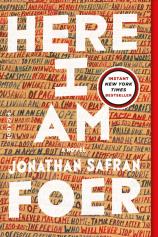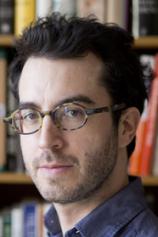Reading Group Guide
Discussion Questions
Here I Am

Introduction
In this sweeping, heartfelt novel, his first in eleven years, the bestselling author of EVERYTHING IS ILLUMINATED and EXTREMELY LOUD AND INCREDIBLY CLOSE explores essential questions of marriage and parenthood, faith and duty, and the ways that history shadows the present. A work of extraordinary scope and intimacy, HERE I AM is the story of the fracturing of the Bloch family: Jacob and Julia and their three sons. The marriage is faltering, as old wounds are confronted in the wake of a devastating discovery. The eldest son, Sam, is on the verge of his bar mitzvah, but no one is certain the ceremony will take place. The Israeli cousins are visiting. And a catastrophic earthquake in the Middle East has set off a series of cascading crises that will lead to a pan-Arab invasion of Israel. Confirming Foer’s stature as one of the most important writers of his generation, HERE I AM is sure to spark meaningful dialogue about a wide range of issues. We hope that the following questions and topics will enrich your experience of this soul-searching, hard-hitting masterwork.
Questions and Topics for Discussion
1. From Isaac and Irving to Jacob and Sam to Tamir and Barak, the male characters of HERE I AMcomplicate simple notions of Jewish masculinity. How do the expectations of manhood differ across generations and nationalities? What do the Bloch and Blumenberg men all have in common?
2. Jacob and Julia are not traditionally religious, but early in their relationship they practiced a “religion for two” --- their own Friday Shabbat, Wednesday strolls and Rosh Hashanah rituals, among others. What do rituals mean for the characters of HERE I AM? How important are rituals --- in religion, in relationships, and in everyday life --- for you?
3. Irv tells his son, Jacob, “Without context, we’d all be monsters” (page 24). What are the contexts that the characters refer to in order to explain their behavior? Are they being honest when they do this? Does the context for behavior make a person more or less responsible for his or her actions?
4. What did you think of Julia’s reaction upon discovering Jacob’s secret cell phone? How would you have reacted?
5. Technology is central to the lives of the characters of HERE I AM: texting, virtual worlds, tablets, the Internet, television, Skype, podcasts, blogs, and so on. What are the different roles that technology plays in the lives of these characters? How does technology affect your own life and the ways you communicate?
6. What do Sam and Billie learn about love and conflict at Model UN? How does the students’ imaginary leadership differ from the responses of world leaders when an actual crisis erupts in the Middle East?
7. In the chapter “Maybe It Was the Distance” (beginning on page 219), we learn that Isaac and Benny (Tamir’s grandfather) were the only siblings out of a family of seven brothers who survived the Shoah. After a few years together in a displaced persons camp, Isaac settles in America, and Benny in Israel. Foer writes, “Isaac never understood Benny. Benny understood Issac, but never forgave him.” Did Isaac evade his responsibilities to the Jewish homeland by moving to Washington, D.C.? What did you think of Jacob’s decision not to go to Israel? Was he being cowardly or courageous? How do the other characters, like Tamir and Irv, define courage?
8. “Before [Jacob and Julia] had kids, if asked to conjure images of parenthood they would have said things like ‘Reading in bed,’ and ‘Giving a bath,’ and ‘Running while holding the seat of a bicycle.’ Parenthood contains such moments of warmth and intimacy, but isn’t them. It’s cleaning up. The great bulk of family life involves no exchange of love, and no meaning, only fulfillment. Not the fulfillment of feeling fulfilled, but of fulfilling that which now falls to you” (page 466). If you are a parent, do you agree? Did this vision of family life ring true to you?
9. At Isaac’s funeral, the rabbi says: “And so it is with prayer, with true prayer, which is never a request, and never praise, but the expression of something of extreme significance that would otherwise have no way to be expressed. As Abraham Joshua Heschel wrote, ‘Prayer may not save us. But prayer may make us worthy of being saved.’ We are made worthy, made righteous, by expression” (page 350). What is the role of prayer for the characters in the novel? What does prayer mean in your own life?
10. Compare the early version of Sam’s bar mitzvah speech, which begins on page 101, to the final version, which begins on page 450. How has his view of the world, and of himself, been transformed?
11. The novel takes its title from passages in Genesis in which God calls out, “Abraham!” before ordering him to sacrifice his son, Isaac. Abraham dutifully responds, “Here I am.” When do the novel’s characters let each other know “Here I am,” bound by duty? How does this kind of duty both make us free and constrain us?
12. How does Jacob and Julia’s divorce affect their three sons? Does it bring them together? What did you think of the “family conversation” between the brothers that begins on page 437?
13. After viewing a documentary on concentration camps, Sam is wracked with the notion that “his life was, if not the result of, then at least inextricably bound to, the profound suffering, and that there was some kind of existential equation, whatever it was and whatever its implications, between his life and their deaths. Or no knowledge, but a feeling… The feeling of being Jewish, but what was that feeling?” (pages 338–39). How does the legacy of the Holocaust affect the Blochs? How do they define their Jewish identity?
14. How did you react to Jacob’s terrifying, exhilarating experience in the lion’s den (page 390)? What was Tamir’s motivation in insisting that Jacob make the leap? How does that moment serve as a metaphor for their adult lives?
15. Discuss the “How to Play” instructions that make up part VII, “The Bible.” What autobiographical details do they reveal about Jacob? Has everyone in his family spent their lives performing an invented role? How do the different characters use humor to express their feelings?
16. Should Julia have run away from Mark, or should she have run to him even sooner? Could Jacob and Julia have saved their marriage? Was it the texts that undid their marriage, or was it something else? Why do you think Jacob wrote the texts?
17. “More than a thousand ‘constructed languages’ have been invented --- by linguists, novelists, hobbyists --- each with the dream of correcting the imprecision, inefficiency, and irregularity of natural language. Some constructed languages are based on the musical scale and sung. Some are color-based and silent. The most admired constructed languages were designed to reveal what communication could be, and none of them is in use” (pages 427–28). The characters of HERE I AM struggle to express outside what they feel inside, to overcome the inadequacy of language and say what they really mean. What conflicts in the book are rooted in failures of communication? Do you struggle, like Julia, Jacob, Sam, Isaac, and the others, to express yourself, to speak hard truths?
18. Do you think the book stakes out a position on Israel and its relationship with the United States and the Arab world?
19. What makes Argus’s story a fitting conclusion to the novel? What has Argus taught Jacob about finding fulfillment in life?
Here I Am
- Publication Date: June 6, 2017
- Genres: Fiction
- Paperback: 592 pages
- Publisher: Picador
- ISBN-10: 1250135753
- ISBN-13: 9781250135759








